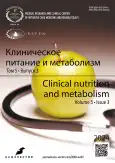Информированность онкологов об основных положениях протокола ERAS и рекомендаций RUSSCO по проведению нутритивной поддержки онкологических пациентов
- Авторы: Сытов А.В.1, Обухова О.А.1, Матвеева С.О.1, Бударгин Е.Е.1, Кудрявцев Ф.А.1
-
Учреждения:
- Национальный медицинский исследовательский центр онкологии им. Н.Н. Блохина
- Выпуск: Том 5, № 3 (2024)
- Страницы: 114-121
- Раздел: Оригинальные исследования
- URL: https://journal-vniispk.ru/2658-4433/article/view/312022
- DOI: https://doi.org/10.17816/clinutr677829
- EDN: https://elibrary.ru/OTCZVA
- ID: 312022
Цитировать
Полный текст
Аннотация
Обоснование. Несмотря на существующие доказательства эффективности нутритивной поддержки онкологических больных, на практике врачи-онкологи используют этот метод недостаточно широко.
Цель. Изучить информированность практикующих врачей о положениях наиболее часто используемых практических рекомендаций Российского общества клинической онкологии (RUSSCO) по диагностике и лечению нутритивной недостаточности онкологических больных, а также установить их приверженность выполнению этих рекомендаций.
Методы. Проведено анкетирование врачей-онкологов. Девять тезисов опросника касались вопросов информированности анкетируемых о положениях клинических рекомендаций RUSSCO по нутритивной поддержке и частоте её назначения, приверженности врачей-онкологов принципам протоколов ускоренной послеоперационной реабилитации, а также их глобальному отношению к скринингу нутритивного статуса.
Результаты. Проанализировано 233 анкеты. Практические рекомендации RUSSCO по нутритивной поддержке были известны 179 (76,8%) респондентам, шкалы оценки нутритивного статуса — 54,1% (n=126), на практике их использовали 43,3% (n=101). Сипинг пациентам рекомендовали 146 (62,7%) врачей. На предоперационном этапе нутритивную поддержку назначали 43,8% (n=102) респондентов, при проведении химиотерапии — 54,5% (n=126), при облучении — 36,1% (n=84), в послеоперационном периоде — 60,1% (n=140) опрошенных. Приверженность врачей-онкологов протоколам ERAS в отношении периода предоперационного голодания и воздержания от принятия жидкости не превысила 10%. Подавляющее большинство респондентов (96,6%) считают важной оценку нутритивного статуса пациента.
Заключение. Несмотря на достаточную информированность о содержании практических рекомендаций по нутритивной поддержке и глобальную приверженность идее скрининга нутритивного статуса, назначение лечебного питания на практике применяют от 36,1 до 62,7% опрошенных. Для изменения парадигмы назначения лечебного питания необходимы просветительская работа и дальнейшие исследования, доказывающие его эффективность, в том числе в контексте ERAS-протоколов.
Полный текст
Открыть статью на сайте журналаОб авторах
Александр Викторович Сытов
Национальный медицинский исследовательский центр онкологии им. Н.Н. Блохина
Email: drsytov@rambler.ru
ORCID iD: 0000-0002-6426-3200
SPIN-код: 9859-4667
кандидат медицинских наук
Россия, 115522, Москва, Каширское шоссе, 23Ольга Аркадьевна Обухова
Национальный медицинский исследовательский центр онкологии им. Н.Н. Блохина
Автор, ответственный за переписку.
Email: obukhova0404@yandex.ru
ORCID iD: 0000-0003-0197-7721
SPIN-код: 6876-7701
кандидат медицинских наук
Россия, 115522, Москва, Каширское шоссе, 23Светлана Олеговна Матвеева
Национальный медицинский исследовательский центр онкологии им. Н.Н. Блохина
Email: matweeva.sveta@yandex.ru
ORCID iD: 0009-0009-0154-5233
Россия, 115522, Москва, Каширское шоссе, 23
Евгений Евгеньевич Бударгин
Национальный медицинский исследовательский центр онкологии им. Н.Н. Блохина
Email: budarginy@gmail.com
ORCID iD: 0009-0003-2359-6871
Россия, 115522, Москва, Каширское шоссе, 23
Филипп Александрович Кудрявцев
Национальный медицинский исследовательский центр онкологии им. Н.Н. Блохина
Email: fil2672@rambler.ru
ORCID iD: 0000-0002-1828-9768
SPIN-код: 5828-5615
Россия, 115522, Москва, Каширское шоссе, 23
Список литературы
- Muscaritoli M, Arends J, Bachmann P, et al. ESPEN practical guideline: Clinical Nutrition in cancer. Clin Nutr. 2021;40(5):2898–2913. doi: 10.1016/j.clnu.2021.02.005 EDN: PYNEVI
- Arends J, Strasser F, Gonella S, et al. Cancer cachexia in adult patients: ESMO Clinical Practice Guidelines. ESMO Open. 2021;6(3):100092. doi: 10.1016/j.esmoop.2021.100092 EDN: JUJSZN
- Ivanova AS, Obukhova OA, Kurmukov IA, Wolf LYa. Review of ESPEN-2021 practical recommendations for cancer patients. Part 1. Clinical nutrition and metabolism. 2022;3(3):140–152. doi: 10.17816/clinutr111900 EDN: YLUOMT
- Ivanova AS, Obukhova OA, Kurmukov IA, Wolf LYa. Review of ESPEN-2021 practical recommendations for cancer patients. Part 2: specific issues of nutritional support. Clinical nutrition and metabolism. 2022;3(4):193–206. doi: 10.17816/clinutr119059 EDN: TKPXSS
- Sytov AV, Zuzov SA, Kukosh MY, et al. Nutritional support. RUSSCO practical recommendations, part 2. Malignant tumors. 2024;14(3s2):163–173. doi: 10.18027/2224-5057-2024-14-3s2-2-08
- Obukhova OA, Bagrova SG, Besova NS, et al. Assessment of the nutritional status of patients with inoperable gastric cancer at the time of initiation of antitumor treatment. Preliminary results of a prospective observational study. Difficult patient. 2018;16(6):6–11. EDN: UYUQCM
- Obukhova OA, Snegovoy AV, Kurmukov IA, et al. Nutritional status of cancer patients before antitumor treatment: a single-center prospective observational study. Clinical nutrition and metabolism. 2020;1(4):178–189. doi: 10.17816/clinutr64707 EDN: NIOWHL
- Obukhova OA, Kurmukov IA, Semenova AA, et al. Nutritional deficiency in patients with newly diagnosed diffuse large B-cell lymphoma. Prevalence and approaches to correction. Oncohematology. 2024;19(3):233–242. doi: 10.17650/1818-8346-2024-19-3-233-242 EDN: RUTLZP
- Practical recommendations for the prevention and treatment of complications of malignant tumors and antitumor drug therapy. Rosoncoweb. Russian Society of Clinical Oncology [Internet]. Available from: https://rosoncoweb.ru/standarts/suptherapy/
- Bausys A, Luksta M, Anglickiene G, et al. Effect of home-based prehabilitation on postoperative complications after surgery for gastric cancer: randomized clinical trial. Br J Surg. 2023;110(12):1800–1807. doi: 10.1093/bjs/znad312 EDN: FWHLGY
- Tsiryatyeva SB, Satyvaldaev MN, Abgaryan AS, Pylenko SA. Clinical and pharmacoeconomic effectiveness of preoperative nutritional support in early rehabilitation of patients with lung cancer. Medical Science and Education of the Urals. 2019;20(3(99)):154–157. EDN: PCORFA
- Ruggeri E, Giannantonio M, Agostini F, et al. Home artificial nutrition in palliative care cancer patients: impact on survival and performance status. Clin Nutr. 2020;39(11):3346-3353. doi: 10.1016/j.clnu.2020.02.021
- Kotov SV, Khachatryan AL, Guspanov RI, et al. Comparative analysis of the use of the accelerated recovery protocol (ERAS) in radical cystectomy. Experimental and Clinical Urology. 2020;(2):78–83. doi: 10.29188/2222-8543-2020-12-2-78-83 EDN: FIHUNZ
- Dalgatov KD, Kozodaeva MV, Titkova SM, et al. Evaluation of the safety of the accelerated recovery protocol (ERAS) in the treatment of patients after pancreaticoduodenal resection. Surgery. Journal im. N.I. Pirogov. 2021;11:19–26. doi: 10.17116/hirurgia202111119 EDN: RHWFIP
- Kurtser MA, Dubinin AA, Grodnitskaya EE, et al. Use of the ERAS protocol in elective gynecological surgery: a prospective non-randomized controlled study. Farmateka. 2019;26(6):36–41. doi: 10.18565/pharmateca.2019.6.36–41
- Kabanova A.S. Study of the prevalence of the use of ERAS protocol components in colorectal surgeries. In: MNSK-2020. Medicine. Proceedings of the 58th International Scientific Student Conference. 2020. P. 34. EDN: IGIJLQ
- Weimann A, Braga M, Carli F, et al. ESPEN practical guideline: Clinical nutrition in surgery. Clin Nutr. 2021;40(7):4745–4761. doi: 10.1016/j.clnu.2021.03.031
Дополнительные файлы







